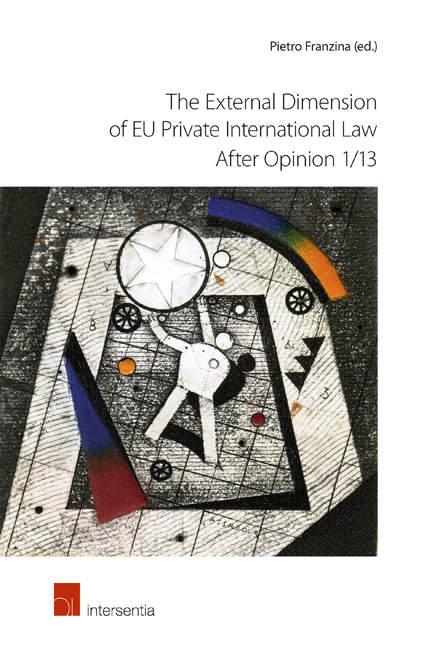Book contents
- Frontmatter
- Preface
- Contents
- PART I THE INTERNATIONAL PROJECTION OF EU PRIVATE INTERNATIONAL LAW - SOME BASIC ISSUES
- PART II OPINION 1/13 AND ITS IMPLICATIONS
- A Critical Analysis of the Judicial Activism of the Court of Justice of the European Union in Opinion 1/13
- The Implications of the European Union's Exclusive Competence with Regard to the Child Abduction Convention
- Consequences of Opinion 1/13 on the Acceptance in the EU of Accessions to the Hague Child Abduction Convention
- International Agreements on Private International Law Matters Not Covered by EU Legislation - Which Test Should Be Adopted to Assess the Competence of the EU?
- PART III THE CHANGING FEATURES OF EU EXTERNAL RELATIONS IN THE AREA OF PRIVATE INTERNATIONAL LAW
- PART IV EU LEGISLATION ON PRIVATE INTERNATIONAL LAW AND EXTRA-EUROPEAN SITUATIONS
Consequences of Opinion 1/13 on the Acceptance in the EU of Accessions to the Hague Child Abduction Convention
from PART II - OPINION 1/13 AND ITS IMPLICATIONS
Published online by Cambridge University Press: 15 December 2017
- Frontmatter
- Preface
- Contents
- PART I THE INTERNATIONAL PROJECTION OF EU PRIVATE INTERNATIONAL LAW - SOME BASIC ISSUES
- PART II OPINION 1/13 AND ITS IMPLICATIONS
- A Critical Analysis of the Judicial Activism of the Court of Justice of the European Union in Opinion 1/13
- The Implications of the European Union's Exclusive Competence with Regard to the Child Abduction Convention
- Consequences of Opinion 1/13 on the Acceptance in the EU of Accessions to the Hague Child Abduction Convention
- International Agreements on Private International Law Matters Not Covered by EU Legislation - Which Test Should Be Adopted to Assess the Competence of the EU?
- PART III THE CHANGING FEATURES OF EU EXTERNAL RELATIONS IN THE AREA OF PRIVATE INTERNATIONAL LAW
- PART IV EU LEGISLATION ON PRIVATE INTERNATIONAL LAW AND EXTRA-EUROPEAN SITUATIONS
Summary
INTRODUCTION
Opinion 1/13 of the Court of Justice of the European Union clarified that the exclusive competence of the European Union encompasses the acceptance of the accession of non-EU States to the 1980 Hague Convention on the Civil Aspects of International Child Abduction (hereafter referred to as the 1980 Hague Child Abduction Convention or the 1980 Hague Convention). As a consequence, EU Member States cannot accept the accession of non-EU States to the Convention without the Union's authorisation. This contribution does not aim at analysing Opinion 1/13 nor does it aim at expressing an opinion on this Opinion. It rather aims at examining, from a pragmatic point of view, what are the practical consequences of Opinion 1/13 on the acceptance, in the European Union, of accessions to the 1980 Hague Child Abduction Convention.
There were many different legal and political reasons why Member States were generally opposed to accepting exclusive external competence of the European Union in the area of child abduction generally or on the matter of the acceptance of accessions of non-EU States to the 1980 Hague Child Abduction Convention. The decision-making procedure in the European Union in family law matters was undoubtedly one of the matters which caused concern. According to Article 81(3) TFEU, measures concerning family law with cross-border implications shall be adopted by the Council, acting unanimously after consulting the European Parliament. While several instruments in the area of family law have been adopted by unanimity, other instruments had to be adopted in enhanced cooperation following a failure to reach the necessary unanimity, showing the difficulty in finding unanimity among Member States in this sensitive area of family law.
More concretely, with respect to the acceptance of non-EU States to the 1980 Hague Child Abduction Convention, Member States take diverging positions. A number of Member States take a liberal approach towards accepting new acceding States, proceeding from a presumption in favour of acceptance.
- Type
- Chapter
- Information
- Publisher: IntersentiaPrint publication year: 2016



